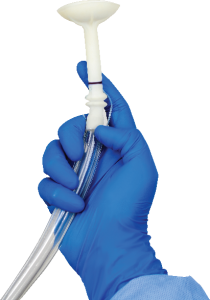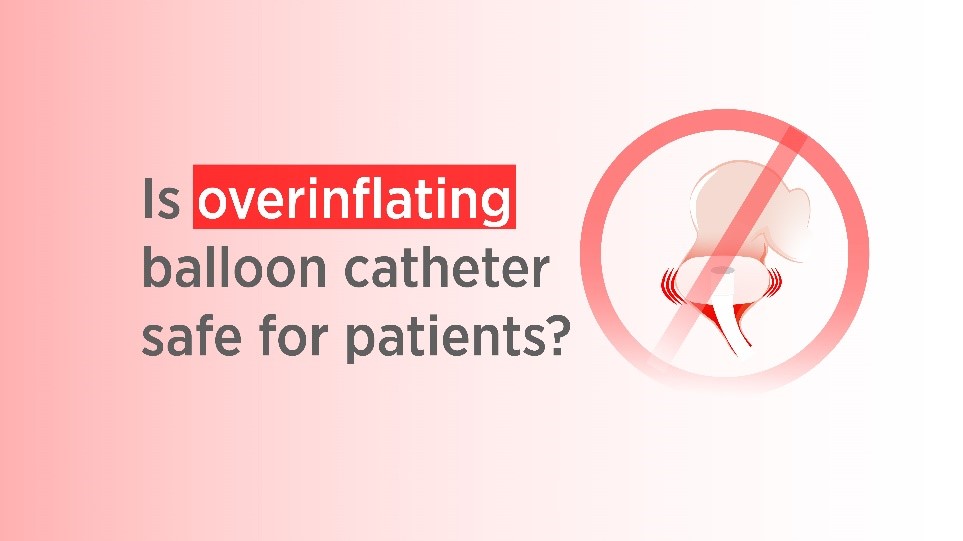Over-inflating balloon catheters is common, but is it a safe for patients?
Fecal incontinence can make a hospital stay complicated. Left in contact with skin, stool can hamper skin integrity, cause incontinence-associated dermatitis, contribute to pressure ulcers, and even lead to dangerous hospital-associated infections (HAIs). Stool may also interfere with the healing process of surgical wounds or pressure injuries.
Many ICUs employ fecal management systems that use high pressure balloon, which is placed into the patient’s rectum at the anorectal junction. The balloon is inflated to hold the rectal tube in place. The device diverts stool from the rectum into a disposable fecal bag. Nursing staff empties the fecal pouch regularly to help keep the patient clean and comfortable.
While widely used, IBCs are an imperfect fecal management system (FMS). To work efficiently, the balloon must be inflated adequately. An under-inflated IBC balloon can allow stool to escape from the rectum; inadequate filling can also allow the balloon to expel out of the rectum.
Since balloon catheters rely on inflating the balloon and a tonic sphincter, in some cases, nurses observe fecal leakage and spontaneous expulsions. To keep IBCs in place and to prevent potential leakage, users often fill the retention balloon with more liquid or air than recommended by the manufacturer. The practice is surprisingly common – in a recent study of 50 patients who had an IBC, over-inflation was the most common problem, with 14 percent of participants having an over-inflated retention balloon.
Why Should Users Not Over-inflate Intrarectal Balloon Catheters?
While over-inflation to avoid leakage is common, it can be detrimental to patient health.

IBC’s exert high outward radial force
The balloon catheters have a wide profile diameter that can go as high as 13.38mm which causes foreign body sensation and discomfort. The silicone can also cause friction at the anal opening and inside the anal canal, causing anal erosion.
When overinflated they exert high pressure at the rectal mucosa, increasing risk of mucosal injury, bleeding, sphincter dysfunction, and anal erosion. Balloon catheters when inflated with the recommended volume exert 32-81mmHg radial pressure on the rectal mucosa. The rectal mucosal capillary compression occurs at 22mmHg with complete occlusion occurring at 36mmHg. Overinflating further increases radial pressure that creates additional discomfort for patients, and it can even lead to mucosal injuries, sphincter dysfunction, and in severe cases, perforations of the rectum or surrounding organs. Over 1500 clinical complications associated with high-pressure balloons have been reported on FDA MAUDE. Over-inflation of the high-pressure balloon is seen in as many as 14% of patients.
Also, the prolonged presence of an intrarectal balloon catheter can lead to skin irritation and inflammation. Friction between the silicone balloon catheter and the delicate sacral skin may cause anal erosion, and even skin breakdown if not adequately managed.

Qoramatic’s soft receptacle exerts no radial pressure
Introducing Qoramatic automated stool management kit to resolves the shortcomings with traditional fecal management system that use balloons. Qoramatic does not contain an inflatable balloon, so eliminates the risks associated with under- or over-inflation. Qoramatic uses an indwelling soft receptacle that stays in place without exerting any outward radial pressure on the rectal mucosa, thereby mitigating the risk of sphincter or rectal injuries associate with high pressure balloon catheters.
Qoramatic creates negative pressure suction that proactively voids the rectum before the episode and diverts the stool away from the patient to an external drainage bag. Proactively voiding the rectum, without relying on peristalsis, reduces the chances of leakage and eliminates the need to milk the device unlike other balloon catheters. It also reduces 7-8 minutes per hour of nursing time by automating FI management, an otherwise time consuming and tedious that would require multiple care providers to turn, reposition, and clean the patients.
To learn more about Qoramatic Automated Stool Management, reach out to a local sales rep at [email protected].


One reply on “Is overinflating balloon catheter safe for patients?”
Noodlemagazine I very delighted to find this internet site on bing, just what I was searching for as well saved to fav